| Srl | Item |
| 1 |
ID:
144645
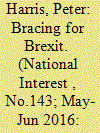

|
|
|
|
|
| Summary/Abstract |
TWENTY-FIVE years ago, Sir Geoffrey Howe resigned as deputy prime minister of the United Kingdom in protest of Margaret Thatcher’s staunch anti-Europeanism. Howe’s departure from the frontbenches came just two days after Thatcher’s denunciation in Parliament of plans for a European single currency (“No! No! No!”), a moment that has since become totemic of what Howe condemned in his resignation speech as the prime minister’s alacrity to undermine her own ministers over European issues.
|
|
|
|
|
|
|
|
|
|
|
|
|
|
|
|
| 2 |
ID:
062756
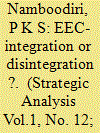

|
|
|
| 3 |
ID:
004571
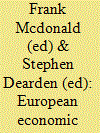

|
|
|
|
|
| Publication |
London, Longman, 1992.
|
| Description |
xxx,241p.
|
| Standard Number |
0582082250
|
|
|
|
|
|
|
|
|
|
|
|
Copies: C:1/I:0,R:0,Q:0
Circulation
| Accession# | Call# | Current Location | Status | Policy | Location |
| 035287 | 337.142/MCD 035287 | Main | On Shelf | General | |
|
|
|
|
| 4 |
ID:
154062
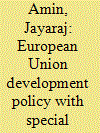

|
|
|
|
|
| Summary/Abstract |
The development cooperation policy of the European Union (EU) ever since its inception has witnessed significant changes in its nature and direction. EU’s development policy framework had its origin in the “association” of the overseas countries and territories (former colonies of founding members) with the fledgling EEC for economic and social development at the insistence of French in the negotiations in 1956 leading to Rome Treaty.
|
|
|
|
|
|
|
|
|
|
|
|
|
|
|
|
| 5 |
ID:
117352
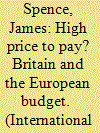

|
|
|
|
|
| Publication |
2012.
|
| Summary/Abstract |
One of the toughest issues at the time of UK accession to the EEC was the cost of being a member of the European club. The nature of the industrialized British economy ensured that the benefits of initial access were less pronounced than in other, longer-standing member states and quickly became a source of heated debate. Margaret Thatcher fought to get 'her money back' in the 1980s and the ensuing British rebate has become totemic for British politicians. As the European Union debates its next multi-annual budget, why has the budget proved so tricky for the UK? What are the drivers for the EU budget? And what is the rebate all about? This article argues that the UK has tugged in different directions over the EC-now EU-budget, which amounts to about 2 per cent of the Union's public expenditure. At times the UK has urged member states to improve financial management. At times it has pressed for greater redistribution between rich and poor regions through the budget. It has consistently criticized the large proportion of the budget going to support agriculture in the Union. It has, from the earliest days of its accession negotiations, argued about how much it contributes to the EU budget and how it should contribute less, whether it counted among the poorer or the richer member states. Britain has argued first for restraint, rather than promoting certain policy sectors in a consistent manner. While cohesion and competitiveness targets outlined in the 2000 Lisbon Strategy received strong support from the UK government and the Europe 2020 goals set concrete growth targets in line with the UK's own, this policy-shaping is tempered by constraint and restraint, and has not allowed the UK to draw full political benefit from the EU budget.
|
|
|
|
|
|
|
|
|
|
|
|
|
|
|
|
| 6 |
ID:
166749
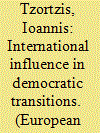

|
|
|
|
|
| Summary/Abstract |
Examining the impact of the international system on the domestic system in countries in the process of democratisation, the article seeks to account for the relation between regime-initiated democratic transitions and the international factor, taking two case studies of the way the international factor interacted with the decisions and tactics of regime and opposition elites. The first is the Spanish exemplary reforma pactada of 1977; the second is the much less studied case of the short-lived and aborted “Markezinis experiment” in Greece in 1973, the failure of which has been blamed by its protagonist on external- mainly American- opposition.
|
|
|
|
|
|
|
|
|
|
|
|
|
|
|
|
| 7 |
ID:
140581
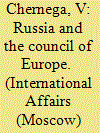

|
|
|
|
|
| Summary/Abstract |
Russian media have paid quite a lot of attention to the April 2014 resolution of the Parliamentary Assembly of the Council of Europe (PACE) that deprived the Russian delegation of its right to vote, a move that, in effect, was upheld by PACE in January 2015.
|
|
|
|
|
|
|
|
|
|
|
|
|
|
|
|
| 8 |
ID:
149203
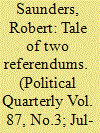

|
|
|
|
|
| Summary/Abstract |
One of the more bruising comments on David Cameron's premiership is that it boils down to one recurring theme: ‘doing what [Harold] Wilson did, only a little bit worse’.1 In the wake of the referendum, that verdict now looks generous. Like Cameron, Wilson was a reluctant European who led a divided party at a time of rising euroscepticism. Like Cameron, he pledged to renegotiate the terms of British membership and put them to the public in a referendum. The difference lies in the verdict. When the polls closed on 5 June 1975, Wilson had won a landslide for membership, winning more than two-thirds of the popular vote. Every part of the United Kingdom voted to stay in, with the exception only of Shetland and the Western Isles.
|
|
|
|
|
|
|
|
|
|
|
|
|
|
|
|
| 9 |
ID:
158176
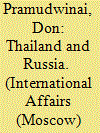

|
|
|
|
|
| Summary/Abstract |
THIS YEAR Russia and Thailand are marking the 120th anniversary of the establishment of diplomatic relations. The kingdom attaches special importance to this event. During Thai Prime Minister Prayut Chan-o-cha's visit to Russia in May 2016, the prime ministers of the two countries agreed to mark the anniversary together. Subsequently, each side established national entities responsible for organizing anniversary-related events and activities. Thailand and Russia announced plans to organize activities in honor of this historical event throughout 2017.
|
|
|
|
|
|
|
|
|
|
|
|
|
|
|
|
| 10 |
ID:
006197
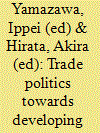

|
|
|
|
|
| Publication |
New York, St Martin's Press, 1993.
|
| Description |
xv,310p.
|
| Standard Number |
0312085575
|
|
|
|
|
|
|
|
|
|
|
|
Copies: C:1/I:0,R:0,Q:0
Circulation
| Accession# | Call# | Current Location | Status | Policy | Location |
| 037924 | 337.1724/YAM 037924 | Main | On Shelf | General | |
|
|
|
|
| 11 |
ID:
051779
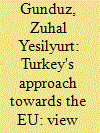

|
|
|
|
|
| Publication |
Sep-Nov 2003.
|
|
|
|
|
|
|
|
|
|
|
|
|
|
|
|